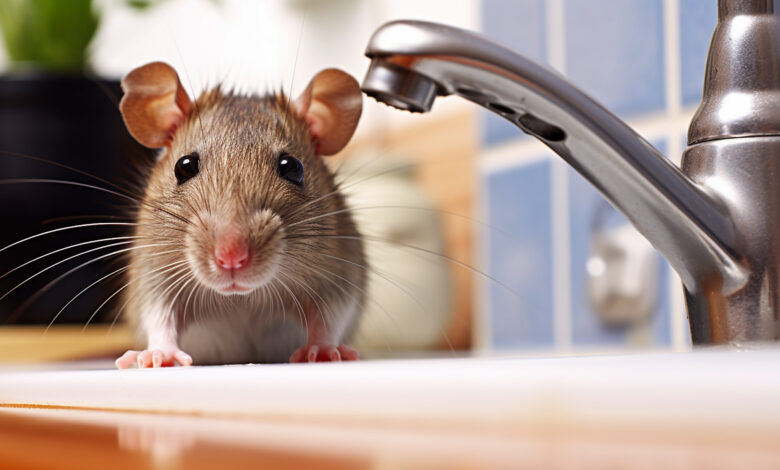
Introduction: Why Rodent Control is Crucial
Rodents like mice and rats are more than just a nuisance; they pose serious health risks and can cause significant damage to your home. These creatures are notorious for spreading diseases, contaminating food supplies, and chewing through wires, which can lead to fire hazards. It’s crucial to take preventive measures to keep these unwelcome guests at bay. Fortunately, numerous household tricks can help you keep mice and rats far away without resorting to harsh chemicals or professional extermination services.Exploring the Exciting World of Electric Go-Karts and Hoverboard Attachments
Understanding the Rodent Problem
Before diving into household tricks, it’s essential to understand why mice and rats invade homes in the first place. The search for food, water, and shelter primarily drives these pests. Homes provide an ideal environment, especially during colder months when resources outside become scarce.
Mice and rats can squeeze through tiny openings, so sealing up potential entry points is crucial. Additionally, these rodents are highly reproductive; a single pair can produce hundreds of offspring in just a few months. This makes it vital to act quickly and consistently to avoid an infestation.Optimizing Traffic Management for a Safer and More Efficient City
Natural Repellents to Keep Mice and Rats Away
Peppermint Oil: A Strong Deterrent
Peppermint oil is one of the most popular natural remedies for repelling rodents. The strong scent of peppermint is overwhelming to mice and rats, making it an effective deterrent. Soak cotton balls in peppermint oil and place them where you’ve noticed rodent activity or where they are likely to enter, such as doorways, windowsills, and corners of rooms.the True Nature of Search Encrypt and Banishing It from Your Digital Realm
Cayenne Pepper and Spicy Sprays
Mice and rats are susceptible to spicy substances. Sprinkling cayenne pepper around entry points or mixing it with water to create a spray can deter these pests from entering your home. You can also use other spicy ingredients like hot sauce or crushed red pepper flakes similarly.
Ammonia: Mimicking Predator Urine
Ammonia has a strong odor that resembles the urine of predators, which naturally frightens rodents. Placing small dishes of ammonia near potential entry points or in areas where rodents have been spotted can drive them away. However, exercise caution when using ammonia, especially if you have pets or children.
Cloves and Clove Oil
Cloves and clove oil are potent natural repellents due to their firm, pungent smell. Like peppermint oil, you can clove oil-soaked cotton balls or sprinkle whole cloves in areas frequented by rodents. The scent will help keep them away from your home. Household Maintenance Tips to Prevent Rodent Infestations
One of the most effective ways to keep mice and rats out is by sealing all possible entry points. Rodents can squeeze through openings as small as a dime, so thoroughly inspect your home for gaps, cracks, and holes. Pay special attention to areas around pipes, vents, windows, and doors. Use caulk, steel wool, or metal mesh to seal these openings.
Proper Food Storage
Mice and rats are always on the lookout for food. Make sure to store food in airtight containers made of metal or thick plastic. Avoid leaving food out overnight, and clean up crumbs and spills immediately. Please pay special attention to pet food, which is often left out and can attract rodents.
Regular Cleaning
Keeping your home clean and clutter-free can significantly reduce the likelihood of a rodent infestation. Regularly vacuum and sweep floors, especially in the kitchen and dining areas where crumbs are likely to accumulate. Declutter areas like basements, attics, and garages, as these are common rodent nesting sites.
Garbage Management
Rodents are attracted to garbage, so managing your trash is essential. Use trash cans with tight-fitting lids, and take the garbage out regularly. Store trash cans away from your home if possible, as the smell can lure rodents toward your property.
Yard Maintenance
Your yard can also be a potential source of attraction for rodents. Keep your grass trimmed and remove any piles of leaves, wood, or debris, as these can serve as nesting sites. If you have fruit trees or a garden, promptly harvest ripe produce and remove fallen fruits, which can attract rodents.
Ultrasonic Repellents: Modern Technology to Deter Rodents
Ultrasonic repellents are electronic devices that emit high-frequency sound waves, which are unbearable to rodents but inaudible to humans and pets. These devices can be plugged into electrical outlets where rodent activity is suspected. While some users report success with ultrasonic repellents, their effectiveness can vary. Using them in conjunction with other preventive measures is a good idea.
DIY Traps and Barriers
Homemade Mouse Traps
If you’re dealing with a small infestation, homemade traps can effectively capture rodents. A straightforward method is to use a bucket and a piece of cardboard or a soda bottle as a ramp. Smear peanut butter on the end of the cardboard or bottle and place it over the bucket. The rodent will be lured by the peanut butter and fall into the bucket, unable to escape.
Aluminum Foil Barriers
Mice and rats dislike the texture and sound of aluminum foil. Wrapping foil around potential entry points, such as the base of doors or windows, can act as a deterrent. This is a temporary solution but can be effective in the short term.
Common Myths About Rodent Control
Regarding rodent control, several myths can lead to ineffective solutions. Understanding these misconceptions can help you avoid common mistakes.
Myth 1: Cats Are Enough To Keep Rodents Away
While cats can be natural predators of mice and rats, more than relying solely on them for rodent control is required. Rodents are clever and can easily avoid areas frequented by cats. Additionally, not all cats are interested in hunting rodents.
Myth 2: Poison is the Best Solution
While rodenticides are effective, they come with significant risks, especially if you have pets or children. Poisoned rodents can also die in hard-to-reach places, leading to unpleasant odors and further complications. Natural and mechanical methods are safer and just as effective if used properly.
Myth 3: Rodents Only Invade Dirty Homes
Even the cleanest homes can fall victim to a rodent infestation. Mice and rats are opportunistic and take advantage of any available food source or shelter. Cleanliness can reduce the likelihood, but it’s not a guarantee.
Rodent-Proofing Your Home: Long-Term Solutions
Use Rodent-Resistant Materials
When repairing or renovating your home, consider using rodent-resistant materials. Steel wool, metal sheeting, and cement are all practical barriers against rodents. These materials can seal cracks and crevices where rodents might enter.
Install Door Sweeps
Door sweeps are simple devices that can be installed on the bottom of doors to prevent rodents from entering through gaps. They are handy for exterior doors leading to the garage or basement.
Secure Your Home’s Foundation
Inspect your home’s foundation regularly for cracks and holes. Even small openings can provide an entry point for rodents. Use concrete or mortar to fill in any gaps, and consider adding a layer of gravel around the perimeter of your home to deter burrowing.
Final Thoughts: The Importance of Consistency
Keeping mice and rats far away from your home requires consistent effort and vigilance. While no single method is foolproof, combining several household tricks mentioned above can significantly reduce the chances of a rodent infestation. Remember that prevention is always more accessible and less costly than dealing with an established infestation.
Questions and Answers
Q: Can peppermint oil be harmful to pets?
A: While peppermint oil is generally safe for pets in small amounts, it’s best to use it in areas out of reach. Ingesting large amounts of essential oils can be toxic to animals.
Q: How often should I replace natural repellents like peppermint oil and cloves?
A: Natural repellents should be replaced every few weeks or when you notice the scent fading. The effectiveness of these repellents relies on their strong odors, which diminish over time.
Q: Are ultrasonic repellents safe for all pets?
A: Ultrasonic repellents are safe for most pets, including cats and dogs, as the sound is inaudible to them. However, the sound may affect small pets like hamsters, guinea pigs, and rabbits, so it’s best to avoid using these devices where such pets are kept.
Q: How can I tell if I have a rodent infestation?
A: Signs of a rodent infestation include droppings, gnaw marks, scampering noises in walls or ceilings, and nests made from shredded materials. If you notice any of these signs, taking action immediately is essential.
Q: Is it necessary to hire a professional exterminator?
A: While professional exterminators can be effective, many rodent issues can be managed with the household tricks mentioned in this article. However, it may be worth consulting a professional if you’re dealing with a severe infestation or your efforts have not succeeded. https://www.thespruce.com/poison-free-rodent-proofing-methods-2656482


